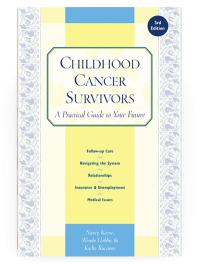Childhood Cancer Survivors
Alcohol
When used in moderation (one drink or less a day), alcohol can be part of a healthy life. Many adults enjoy a glass of wine with meals or with friends. However, alcohol is frequently abused.
Alcohol is a depressant that affects the central nervous system. Just two beers or drinks can impair coordination and thinking. Excessive drinking can cause liver damage and increase your risk of mouth and liver cancer. This number of drinks can also cause high blood pressure, stroke, decreased fertility, and miscarriages in women. 5 If you drink at all while pregnant, your baby can be harmed. Excessive drinking can also dramatically lower the quality of your life.
Some survivors have seen firsthand the effect of drinking on their families:
I’m a long-term leukemia survivor. My father’s an alcoholic and I drank way too much in my 20s to escape my feelings. But I decided I wasn’t going to raise my children the way I was raised. I got some counseling and now I only drink socially, and I’m very careful with how much I drink.
Many adults and adolescents think drinking beer is somehow not the same as drinking wine or liquor. But one beer contains the same amount of alcohol as a glass of wine or a shot (ounce) of hard liquor. Binge drinking (drinking several drinks at one time followed by periods of no drinking) is just as dangerous to your body as daily, heavy drinking. Binge drinking is especially prevalent in high schools and on college campuses. Rather than being swayed by peer pressure to engage in these activities, avoid them altogether or think of strategies ahead of time to avoid excessive drinking. You could drink a soft drink at parties instead of alcohol, or sip one weak alcoholic drink throughout the entire evening.
I drink beer and wine, and I have a fondness for single malt scotch. I probably like beer too much. I think I probably drink too much and need to find a happy medium. When I was a kid, my dad came home from work and had two or three beers every night. I’m in that mode now and it bothers me. I feel like I’m becoming my father.
Scientific evidence of the healthful effects of alcohol use has frequently been in the news, causing confusion about the risks and benefits of drinking. Although a daily glass of wine may slightly lower the risk of heart disease, better ways to accomplish this are to exercise, eat less fat, and maintain a normal weight. Survivors of childhood cancer may already have damaged organs from radiation or chemotherapy treatments. Excessive alcohol can increase that damage. In addition, if you are infected with the hepatitis C virus, you should not drink any alcohol.
I am the parent of a teen who had cancer. He doesn’t talk about it much, and only occasionally do I get an inkling of what he is thinking. I know he believes so strongly both in science and in his own strength that he feels he will survive and live to a ripe old age. I may complain because he is not a social butterfly, but it has made all of this easier. He has yet to date or even go out with “the guys.” When I told him as he went off to college that drinking on a chemo-liver would be deadly, he said, “Good, now I have an excuse not to drink.”
To get help for problem drinking, join Alcoholics Anonymous ® (to find a meeting near you visit www.aa.org ) and talk with your healthcare provider.
Table of Contents
All Guides- 1. Survivorship
- 2. Emotions
- 3. Relationships
- 4. Navigating the System
- 5. Staying Healthy
- 6. Diseases
- 7. Fatigue
- 8. Brain and Nerves
- 9. Hormone-Producing Glands
- 10. Eyes and Ears
- 11. Head and Neck
- 12. Heart and Blood Vessels
- 13. Lungs
- 14. Kidneys, Bladder, and Genitals
- 15. Liver, Stomach, and Intestines
- 16. Immune System
- 17. Muscles and Bones
- 18. Skin, Breasts, and Hair
- 19. Second Cancers
- 20. Homage
- Appendix A. Survivor Sketches
- Appendix B. Resources
- Appendix C. References
- Appendix D. About the Authors
- Appendix E. Childhood Cancer Guides (TM)

